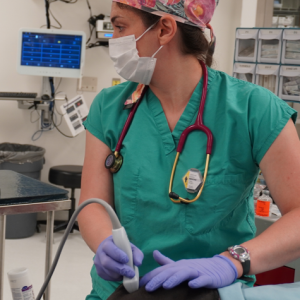A New Drug to Help Relieve Chemotherapy Induced Diarrhea in Dogs
Diarrhea is a common side effect in dogs undergoing chemotherapy treatments for cancer, and it can significantly compromise their already debilitated health. The exact pathophysiology of chemotherapy induced diarrhea (CID) is not completely understood, but the chemotherapy agent likely causes gastrointestinal inflammation and destruction, resulting in malabsorption issues. The severity can range from mild inappetence and soft stools to hemorrhagic diarrhea and dehydration, and affected dogs can suffer from malnutrition and fluid and electrolyte depletion. Since the primary purpose of cancer treatment is to extend a dog’s life without sacrificing their quality of life and comfort, this side effect needs to be mitigated to continue treatment. In December 2021, the U.S. Food and Drug Administration (FDA) conditionally approved Canalevia-CA1 for the treatment of CID in dogs. This is the first treatment approved for this condition; previously, veterinarians had to rely on supportive therapies to manage CID.
How does Canalevia-CA1 work?
Crofelemer is the active ingredient in Canalevia-CA1, which already is used to treat non-infectious diarrhea in adult humans with HIV/AIDS who take antiretroviral therapy. While the exact way crofelemer works in dogs has not been fully evaluated, it likely works the same way as it does in humans.
In the gastrointestinal tract, intestinal epithelial cells regulate chloride ion and water secretion by using two types of chloride channels.
- Cyclic adenosine monophosphate-stimulated cystic fibrosis transmembrane conductance regulator chloride channels — These channels help maintain salt and water balance on many surfaces in the body, including the gastrointestinal tract.
- Calcium-activated chloride channels — These channels play a role in sensory transduction, epithelial secretion, and smooth muscle contraction.
Crofelemer inhibits these channels at the intestinal epithelial cell’s luminal membrane, blocking chloride ion secretion and the accompanying high volume water loss that occurs during diarrhea. This normalizes the flow of chloride ions and water entering the gastrointestinal tract.
Is Canalevia-CA1 effective?
A pilot study was conducted to determine a reasonable expectation for the drug’s effectiveness.
- Objective — The objective was to assess the clinical effectiveness of crofelemer administered orally in alleviating clinical signs of diarrhea in dogs and to identify the optimum endpoint to define effectiveness in future proposed clinical field studies.
- Study animals — The study was conducted on 53 shelter-housed and eight client-owned dogs who had diarrhea. The dogs ranged in age from 2 months to 12 years, and they had a fecal score of 4 or 5.
- Fecal score — Fecal scores were rated as follows:
1 — Well-formed stools with a slightly moist surface that leaves marks when picked up
2 — Soft or extremely soft, moist, amorphous
3 — Viscous fluid with some particulate matter
4 — Watery, liquid stools with little particulate matter visible
5 — Severe watery diarrhea with no particulate matter visible
6 — Hemorrhagic diarrhea
- Exclusion criteria — Dogs were excluded if they tested positive for helminths, coccidia, or giardia; if they were suspected of having parvovirus; or if they had been treated with medications such as metronidazole, albendazole, probiotics, aminopentamide, and sulfadimethoxine within seven days of enrollment.
- Drug administration — Crofelemer was administered as packets of enteric-coated beads containing 40 mg of the active ingredient to 29 dogs at a dose range of 1.9 to 12.9 mg/kg orally every 12 hours for three days. The control was administered to 32 dogs as packets containing enteric-coated beads without the active ingredient.
- Observations — Baseline physical examination, hematology, chemistry, fecal examination, and fecal scores were obtained. Fecal scores were assessed every four hours during the three-day treatment period. Daily assessments included body temperature, general attitude, hydration status, appetite, and reaction to abdominal palpation.
- Results — Thirty-seven dogs were excluded from the study, leaving 12 dogs who received crofelemer and 12 dogs who received the control. Diarrhea was resolved in 75% of the dogs receiving crofelemer and in 25% of the dogs in the control group.
- Conclusion — The study results support a reasonable expectation of effectiveness for Canalevia-CA1 administered orally twice a day for three days to treat CID in dogs.
Is Canalevia-CA1 safe?
Numerous studies evaluated Canalevia-CA1’s safety.
- A nine-day target animal safety study — This study evaluated Canalevia-CA1’s safety in dogs after twice daily oral tablet administration for nine days. No deaths or clinically significant illness occurred during the period studied.
- A nine-month target animal safety study — This study evaluated crofelemer’s toxicity potential when administered orally to dogs for nine months. No deaths occurred during the study period. Abnormal feces, such as black and rust mucoid feces and diarrhea, were observed in dogs receiving high doses.
- A 30-day target animal safety study — This study evaluated crofelemer’s toxicity potential when administered orally to dogs for 30 days. No deaths occurred during the period. Abnormal feces, such as black and rust mucoid feces and diarrhea, were observed in dogs receiving high doses.
- Cardiovascular safety study — This study evaluated the potential cardiovascular effects of crofelemer in dogs. The study showed no effects on systolic, diastolic, or mean arterial blood pressure, heart rate, or ECG related to treatment.
- Field study — This study evaluated crofelemer’s safety for treating acute diarrhea in dogs. No deaths occurred during the study. Adverse reactions included vomiting, decreased blood glucose levels, urinary system abnormalities, upper respiratory signs, and decreased serum calcium levels, but the number of dogs affected was not statistically significant.
The studies performed support the safe use of Canalevia-CA1 when administered orally according to the dosing instructions for dogs.
The FDA’s conditional approval of Canalevia-CA1 will provide veterinarians with a valuable tool to help manage CID in their canine cancer patients. This drug should help improve the quality of life for these dogs so their life can be extended without compromising their overall well-being.








List
Add
Please enter a comment